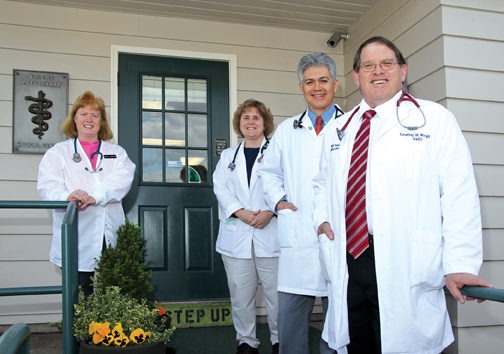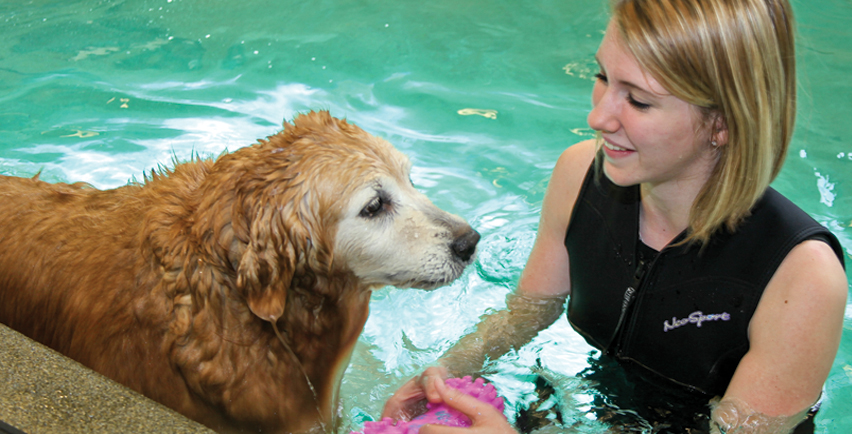Wright Veterinary Medical Center, PC
By Frederick Jerant
Dorothy Gale would be relieved. You won’t find lions…or tigers…or bears (oh my!)
at Wright Veterinary Medical Center, PC in Bethlehem.
But many years ago, you could have found…an elephant?
“Yes, an elephant,” chuckles hospital director Geoffrey H. Wright, VMD. “My late father, Clifford F. Wright Jr., VMD, started the business in 1949 by turning a barn into a hospital for both large and small animals. One day, the circus was in town, and one of its elephants was ailing with an abscess. Its handlers brought it in, and my dad took care of it.”
In 1955, the senior Wright adapted to the changing demographics of the Lehigh Valley, and limited his practice to small animals.
Today, the Center is run by four partners: Dr. Wright, who serves as president and hospital director; Paula J. Flynn, DVM, director of human resources; Higinio Ortiz, DVM, director of surgery; and Eileen L. Mera, VMD, safety director.
The practice cares for just about any pet species—dogs, cats, birds, reptiles, exotics and “pocket pets” such as hamsters and gerbils.
Located in four buildings on 3.5 acres of land, Wright Veterinary Medical Center offers healing services that are much like those we’d use ourselves:
• routine health examinations
• advanced and routine surgical procedures
• complete dental care and x-ray services
• wellness and preventive medicine
• allergy and skin testing
• dietary and nutritional counseling
• digital X-rays
• ultrasound
• on-site laboratory
• and others, including acupuncture, microchipping, laser surgery, cardiac consultations and behavioral consultations.
 The medical staff at Wright Veterinary is also quite diverse, encompassing 12 veterinarians, 19 nurses, a laboratory technician, six kennel attendants, and numerous support functions.
The medical staff at Wright Veterinary is also quite diverse, encompassing 12 veterinarians, 19 nurses, a laboratory technician, six kennel attendants, and numerous support functions.
The vets have earned their doctoral degrees from many institutions—the University of Pennsylvania, Kansas State University, University of Missouri, University College Dublin, University of Florida, University of Tennessee, Cornell University and Tufts University among them.
Wright says that the mixture of educational backgrounds serves the hospital well, because there will be a broad range of perspectives and approaches taken to their animal charges.
For example, groups of doctors make daily rounds to visit their patients. “It helps with the distribution of cases,” Wright says, “and it’s good to have more than one set of eyes looking at a situation.”
He adds that medical treatment plans often evolve as group decisions. In fact, Wright believes that input from multiple sources is a key to the center’s success.
“We value comments from everyone, not just the doctors. Nurses, kennel staff, and laboratory workers are some of our best sources of information. That’s why we have monthly staff meetings, as well as sessions with our managers and directors,” Wright says.
He also wants to maintain his father’s dedication to staying on top of technological advances and other services. The center routinely consults with specialists in internal medicine, cardiology, ophthalmology, pain management and other fields. “These experts sometimes spend an entire day with our staff, updating them on current techniques and other matters,” Wright says.
The latest addition to Wright Medical Center’s service roster is physical therapy. “We began offering PT as an option about eight years ago,” Wright says, “as an alternative treatment for dogs that had back problems such as degenerative arthritis. The program evolved under our staff physiotherapist. After we cleared the township’s regulations, we established a complete center.”
The facility takes varied approaches to therapy. There’s a heated in-ground pool with ramp access, standard and inclined water treadmills (don’t worry; your animal buddy’s not submerged) and regular treadmills. Low-impact flooring in the exercise room minimizes the chance of injuries.
The center offers non-traditional treatments as well, including acupuncture, Chinese and Western herbal therapies, aromatherapy, Reiki (a Japanese technique often called “palm healing”), reflexology and Bach Flower Essence, a homeopathic approach.
Wright Veterinary’s therapy center may be its newest innovation—but it certainly won’t be the last. “We’ll have a remodeling project underway very soon,” he says. “The goal is to expand the front office, improve traffic flow through the hospital and cut down on patients’ waiting time.”
“We value comments from everyone, not just the doctors. Nurses, kennel staff, and laboratory workers are some of our best sources of information. That’s why we have monthly staff meetings, as well as sessions with our managers and directors,” Wright says.
He also wants to maintain his father’s dedication to staying on top of technological advances and other services. The center routinely consults with specialists in internal medicine, cardiology, ophthalmology, pain management and other fields. “These experts sometimes spend an entire day with our staff, updating them on current techniques and other matters,” Wright says.
The latest addition to Wright Medical Center’s service roster is physical therapy. “We began offering PT as an option about eight years ago,” Wright says, “as an alternative treatment for dogs that had back problems such as degenerative arthritis. The program evolved under our staff physiotherapist. After we cleared the township’s regulations, we established a complete center.”
The facility takes varied approaches to therapy. There’s a heated in-ground pool with ramp access, standard and inclined water treadmills (don’t worry; your animal buddy’s not submerged) and regular treadmills. Low-impact flooring in the exercise room minimizes the chance of injuries.
The center offers non-traditional treatments as well, including acupuncture, Chinese and Western herbal therapies, aromatherapy, Reiki (a Japanese technique often called “palm healing”), reflexology and Bach Flower Essence, a homeopathic approach.
Wright Veterinary’s therapy center may be its newest innovation—but it certainly won’t be the last. “We’ll have a remodeling project underway very soon,” he says. “The goal is to expand the front office, improve traffic flow through the hospital and cut down on patients’ waiting time.”





